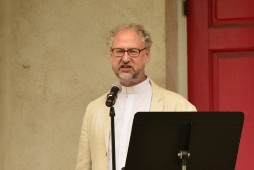Sermons
This Week's Sermon

“Preparedness”
Sermon on Sunday, November 30, 2025
Dear Church,
November 30 is the Feast Day of Saint Andrew, the apostle, the brother of Peter. Andrew is especially revered in Scotland and in the Greek Orthodox Church where he holds the special title “Πρωτόκλητος,” (Prōtoklētos), the “first-called.” He was the first disciple who answered Jesus’ call, “Follow me!”
Andrew reminds us of the importance of calling others to Christ, sharing our spiritual experiences, inviting people into the orbit of Jesus. Andrew brought his brother along, the famous Simon Peter. “You must meet this man,” he said. “He’s special.” If it had not been for Andrew, Peter might have never been mentioned in the Bible, not even in a side note. Such is the power of invitation… Fact is, some of our church members would not be here today if not for a simple invitation. “Check out this church! It’s not half bad! There is something there!”
According to tradition, Andrew brought the gospel to eastern Europe and was martyred on an x-shaped cross, the kind of cross you will still find in Europe at train track intersections to alert drivers. Andrew was prepared to give his life. And that is the topic for this Sunday: to be prepared. To be ready. To be spiritually awake. It’s an advent theme.
In the gospel reading, we hear a lot about preparedness. “You must be ready,” Jesus said, “For the Son of Man will come at an hour when you do not expect him.” In the context of the reading, it definitely feels as though Jesus is talking about the end of times. And what a loaded topic that is, what a gloomy feeling it evokes! Many people throughout history have attempted to predict an end point to life on this earth… and they have failed miserably, without fail! When you look at the long list of predictions, it’s rather obvious that we simply can’t predict such a thing. You will find predictions by cult leaders and Puritan ministers, Anabaptists, Islamic sects, American tele-evangelists, even a few Christian mainstream theologians, old Mayan traditions, Nostradamus... In the modern scientific age, people have tried to predict the end of times based on super-volcanic eruptions or a meteor hitting the earth or the carbon dioxide levels dropping precariously… Now they calculate by millions of years - and are likely no closer. So, why do humans keep trying? Is it to gain some kind of certainty? Is it related to our fear of death? Are we enamored with doom?
When you look at the data, it’s so obviously foolish to predict a global end time. I mean, let’s be real, we still have trouble predicting the weather for tomorrow… Jesus says in the gospel. “But about that day or hour no one knows, not even the angels in heaven, nor the Son, but only the Father.” That should be the end of the discussion for us. Could it be that the physical coming of the Lord is not the actual point in the gospel? Could it be that we ought to interpret these writings in a less sensational and more spiritual way? For instance: how prepared are we when God is knocking on our door, when we are called to change in some way, when certain things in our lives really come to an end and others begin, when our world changes? That requires a form of preparedness. Are we mentally, spiritually prepared for such things? That’s a more interesting question because we can actually do something about it...
Let me use an analogy from real life. In our community, we have a bunch of people who regularly train to be prepared… for a major disaster. They are called firefighters. They could not do their job without repetition exercises, training for a worst-case scenario. They need to know their equipment. They need to make sure it works when needed. They need to know exactly what to do when a house is on fire, how to save lives and protect their own. They practice preparedness every year, every month and probably every week.
In the spiritual world, there are also practices required to equip us for a serious event, which could be the loss of a loved one or a major crisis in life or a life-threatening, even terminal disease. There are people among us who deal with such things right now. I could give you two dozen names and probably more. And someone might say, “Pastor, you can’t possibly prepare for what I am going through right now.” And you know what, you are probably right! One cannot prepare for the curve balls life throws us in any specific way. But we can prepare ourselves spiritually for the scary unknown and fortify ourselves through prayer, gratitude, developing compassion, humility and not taking anything for granted… People who develop these virtues, people who are surrounding themselves with faith, hope, love, the Holy Trinity of Christian virtues, they will at least be somewhat ready and will often further grow as human beings, as spiritual beings during the end times that they experience in their own lives. The truth is, we are all mortal, and God loves us in our mortality and beyond it, which is of course a statement of faith – staring in the face of mortality. Prepare to be prepared. Have faith. And hope. And love.
Amen.